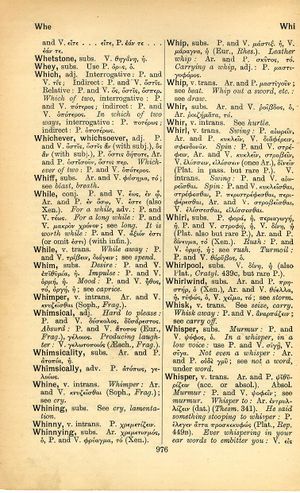whichever: Difference between revisions
From LSJ
νὺξ βροτοῖσιν οὔτε κῆρες οὔτε πλοῦτος, ἀλλ' ἄφαρ βέβακε, τῷ δ' ἐπέρχεται χαίρειν τε καὶ στέρεσθαι → starry night abides not with men, nor tribulation, nor wealth; in a moment it is gone from us, and another hath his turn of gladness, and of bereavement | Starry night does not remain constant with men, nor does tribulation, nor wealth; in a moment it is gone from us, and to another in his turn come both gladness and bereavement
(CSV5) |
m (Woodhouse1 replacement) |
||
| Line 1: | Line 1: | ||
{{Woodhouse1 | {{Woodhouse1 | ||
|Text=[[File:woodhouse_976.jpg|thumb|link={{filepath:woodhouse_976.jpg}}]] | |Text=[[File:woodhouse_976.jpg|thumb|link={{filepath:woodhouse_976.jpg}}]] | ||
===adjective=== | |||
[[prose|P.]] and [[verse|V.]] [[ὅστις]], [[ὅστις]] ἄν (with subj.), ὃς ἄν (with subj.), [[prose|P.]] [[ὅστις δήποτε]], [[Aristophanes|Ar.]] and [[prose|P.]] [[ὁστισοῦν]], [[ὅστις περ]]. | |||
[[whichever of two]]: [[prose|P.]] and [[verse|V.]] [[ὁπότερος]]. | |||
}} | }} | ||

